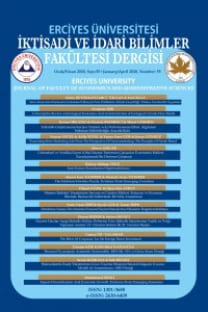KESİNHESAP KANUNU VE BÜTÇE HAKKI: TBMM GÖRÜŞMELERİ ÜZERİNDEN BİR ANALİZ
Kesinhesap Kanunu ve Bütçe Hakkı: TBMM Görüşmeleri Üzerinden Bir Analiz279KESİNHESAP KANUNU VE BÜTÇE HAKKI: TBMM GÖRÜŞMELERİ ÜZERİNDEN BİR ANALİZFerhat AKBEY*Musa GÖK**ÖZParlamentonun bütçe hakkının birbirini tamamlayıcı iki unsuru söz konusudur: Birincisi, yürütme erkinin harcama yapmasına ve gelir tahsil etmesine “önceden izin verme ve sınırlandırma”; ikincisi ise bütçe uygulandıktan sonra uygulama sonuçlarını “denetleme”. Parlamento ilkini Merkezi Yönetim Bütçe Kanunu görüşmelerinde, ikinci unsuru ise Sayıştay üzerinden yapılan denetimler ve Kesinhesap Kanunu müzakerelerinde devreye alır. Buna karşılık, literatürde genellikle birinci unsur ön plana çıkarılırken, ikinci unsurun özellikle Kesinhesap Kanunu kısmı pek vurgulanmaz. Bu çalışmada, Kesinhesap Kanun teklifinin TBMM’deki görüşmeleri mercek altına alınmış ve Kesinhesap üzerinden Meclis’in etkili bir denetim yapıp yapmadığı incelenmiştir. 2004-2017 yılları arası Merkezi Yönetim Bütçe Kanunu ve Kesinhesap Kanunu Meclis görüşme tutanakları ayrıntılı biçimde taranmış ve sonuçlar sayısal olarak ortaya konmuştur. Bu bağlamda, görüşme gün sayıları, kanunlarla ilgili toplamda ve madde başına alınan söz ve sorulan soru sayıları, ayrıca verilen önerge sayıları karşılaştırılmıştır. Sonuçta TBMM’de Kesinhesap Kanunu’nun pek önemsenmediği ve bu açıdan “denetim” mekanizmasının etkin işlemediği sonucuna ulaşılmıştır.
FINAL ACCOUNTS LAW AND POWER OF PURSE: AN ANALYSIS BASED ON TGNA NEGOTIATIONS
Parliaments have the power of purse that has two complementary components: First one is to give permission to and put limitations on the Executive body to collect revenues and spend; and the second one is to “audit” after the implementation of the budget. The parliament runs the first component during the budget negotiations, and the second one via audits by the Audit Court as well as via negotiations on theFinal Accounts Law. Despite this, in the literature, generally the first component is emphasized, and especially the Final Accounts Law part of the second component is neglected. In this study, Final Accounts Law negotiations are scrutinized to search whether TGNA makes an effective audit by that Law or not. TGNA minutes covering 2004-2017 Budget and Final Accounts Law negotiations are comprehensively inspected and numeric results are put forward. Within this framework; number of negotiation days, taking the floor and interrogation numbers on these laws in total and per article, as well as the number of proposals are compared. The result is the factthat,theTGNAdoes notpaysufficientattentiontotheFinalAccountsLaw,andthe parliamentary audit mechanism does not work well in this sense.
___
- Bağlı, M. S. (2010). TBMM’nin bütçe sonuçlarını denetleme süreci. Yasama Dergisi, 16, 103-143.
- Bağlı, M. S. (2012). Teorik ve tarihsel açıdan bütçe hakkı. Yasama Dergisi, 20, 39- 77.
- Cilavdaroğlu, A. A. ve Ekici, B. (2013). Türkiye Büyük Millet Meclisinin bütçe hakkını kullanabilme kapasitesi. Amme İdaresi Dergisi, 46(3), 59 - 88.
- Çam, M. U. (2017). Kamu harcamalarında etkinlik ve parlamenter denetim. D.E.Ü. Hukuk Fakültesi Dergisi: Prof. Dr. Şeref ERTAŞ'a Armağan, 19, 2841-2870.
- Çiçek, H. G. ve Çiçek, Ş. E. (2019). Maliye bakanlarının parlamentodagerçekleştirdiği bütçe sunuş konuşmalarının tahlili: Türkiye örneği. Maliye Araştırmaları Dergisi, 5(1), 1-19.
- Çiçek, H. G. ve Dikmen, S. (2015). Osmanlı Devleti’nde bütçenin ve bütçe hakkının tarihsel gelişimi. Ekonomik ve Sosyal Araştırmalar Dergisi, 11(2), 83-98.
- Gürsoy, B. (1981). Kamusal Maliye İkinci Cilt: Bütçe (3. Baskı). Ankara Üniversitesi Siyasal Bilgiler Fakültesi Yayın No: 481, Ankara: Sevinç Matbaası.
- İpek, E. A. Ş. (2017). Bütçe hakkının kullanılması bakımından TBMM’nin bütçesürecindeki rolünün değerlendirilmesi. Maliye Finans Yazıları, 107, 69-108.
- Kıral, H. ve Akdemir, T. (2019). Bütçe hakkı kapsamında Türkiye’de ödenekaktarmalarının değerlendirilmesi. Sayıştay Dergisi, 112, 107-135.
- Konukman, A. (2015). Türkiye’de bütçe hakkının kullanımı: Sorunlar ve çözüm önerileri. Artvin Çoruh Üniversitesi Uluslararası Sosyal Bilimler Dergisi, 1, 23-65.
- Narter, R. (2012). Anayasal açıdan bütçe hakkı. Erzincan Üniversitesi Hukuk Fakültesi Dergisi, 1(2), 35-52.
- Özalp, N. Y. (2006). Türkiye'de yasa yapımı: Nicelik sorunu mu, nitelik sorunu mu?. Ankara Üniversitesi SBF Dergisi, 61(1), 268-295.
- TBMM (2019, Temmuz 01-30). Erişim adresi https://www.tbmm.gov.tr/develop/owa/tutanak_sd.sorgu_baslangic
- Yılmaz, H. H. ve Biçer, Y. (2010). Parlamentonun bütçe hakkını etkin kullanımınınyeni bütçe sistemi çerçevesinde değerlendirilmesi. Maliye Dergisi, 158, 201 225.
- Mevzuat:
- 1982 Anayasası
- 1050 sayılı (mülga) Muhasebe-i Umumiye Kanunu
- 5018 sayılı Kamu Mali Yönetimi ve Kontrol Kanunu
- 6085 sayılı Sayıştay Kanunu
- TBMM İçtüzüğü
- ISSN: 1301-3688
- Yayın Aralığı: Yılda 3 Sayı
- Başlangıç: 1981
- Yayıncı: -
Sayıdaki Diğer Makaleler
ÖRGÜTSEL MEŞRUİYET: KURUMSAL KURAM GÖZÜYLE DERİNLEMESİNE BİR BAKIŞ
ÇEVRİMİÇİ YORUMDAN ALGILANAN FAYDA: ÜRÜN KULLANIM SÜRESİNİN VE YORUMUN İNANDIRICILIĞININ ROLÜ
AMERİKA BİRLEŞİK DEVLETLERİ’NDE VERGİ HARCAMALARININ GENEL SEYRİ VE TRUMP DÖNEMİ VERGİ HARCAMALARI
ENERJİ TÜKETİMİ- EKONOMİK BÜYÜME İLİŞKİSİ: TÜRKİYE İÇİN FREKANS ALANINDA NEDENSELLİK YAKLAŞIMI
DEMOKRASİ VE İKTİSADİ BÜYÜME İLİŞİSİ: TÜRKİYE İÇİN BİR ANALİZİ
TÜRKİYE'DE HİSSE SENETLERİ, BANKA KREDİLERİ VE EKONOMİK BÜYÜME İLİŞKİSİ: ZAMAN SERİLERİ ANALİZİ
AVRUPA BİRLİĞİ’NDE MALİ VE PARASAL KURAL UYGULAMALARI
KESİNHESAP KANUNU VE BÜTÇE HAKKI: TBMM GÖRÜŞMELERİ ÜZERİNDEN BİR ANALİZ
UZUN DÖNEMDE İŞÇİ DÖVİZ HAVALELERİNİN İHRACAT ÜZERİNDEKİ ETKİSİ: HOLLANDA HASTALIĞI GEÇERLİ Mİ?
